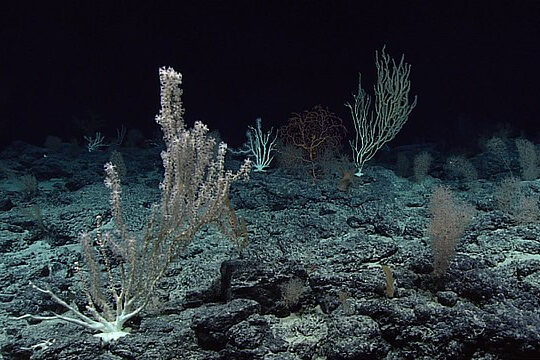
The controversial industry of deep-sea mining seems to have more far-reaching ecological implications than previously thought, as evidenced by declining animal populations in areas subject to mining activities.
Recent analysis, based on ecological assessments conducted following Japan’s successful cobalt crust extraction from deep-sea mountains in 2020, reveals a decrease in marine life like fish and shrimp a year later. This decline extends beyond the impact zone, with areas outside of it witnessing a density reduction of over 50%.
Lead author of the study, ecologist Travis Washburn, who collaborates with the Geological Survey of Japan, underscores the significance of these findings in shaping regulatory decisions concerning deep-sea mining proposals.
“We may need to broaden what we think of in terms of what deep-sea mining impacts are,” said Washburn, whose work focuses on the benthic zone – the lowest region of a body of water. “There are large implications if we are currently treating some sites as unimpacted or controls when they are in fact changing from indirect mining impacts.”
The study examined data collected during visits by Japanese mining engineers to the Takuyo-Daigo seamount. Their observations highlighted a 43% decline in fish and shrimp density within areas affected by sediment pollution resulting from test extractions, and a more pronounced 56% decrease in adjacent regions.
“It is easy to assume that once you are outside the zone of deposition there will be no impacts from mining,” said Washburn. “However, if some animals leave the periphery of the deposition area, this would extend the total area of impact.”
Washburn stresses the need for caution in rushing into seabed mining, emphasising that comprehending the full extent of its impact on marine ecosystems could take decades.
While the International Seabed Authority, along with its 168 member states, has yet to establish regulations governing deep-sea mining, a recent deadline of July 9th for adopting such regulations or evaluating mining contract applications under existing laws has passed without resolution. This raises concerns that commercial deep-sea mining could proceed without proper regulations in place.
Washburn urged decision-makers: “Use all the data we currently have out there. There is still so much we don’t know, but it will likely be decades to answer some of those questions.”
——————————————————————————
At Natural World Fund, we are passionate about stopping the decline in our wildlife.
The decline in our wildlife is shocking and frightening. Without much more support, many of the animals we know and love will continue in their decline towards extinction.
When you help to restore a patch of degraded land through rewilding to forests, meadows, or wetlands, you have a massive impact on the biodiversity at a local level. You give animals a home and food that they otherwise would not have had, and it has a positive snowball effect on the food chain.
We are convinced that this is much better for the UK than growing lots of fast-growing coniferous trees, solely to remove carbon, that don’t actually help our animals to thrive.
This is why we stand for restoring nature in the UK through responsible rewilding. For us, it is the right thing to do. Let’s do what’s right for nature!
Donate today at https://naturalworldfund.com/ and join in the solution!

